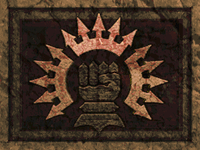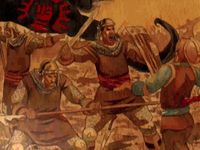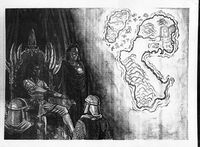Lore:Crowns
The Crowns are what is left of the old ruling class of Yokuda, the Na-Totambu. They can be found mostly in northern and inland Hammerfell and are known for still honoring the ancient Redguard ways.[1][2] Generally speaking, the Crowns dominate the northern region of Hammerfell and continue to adhere to their Yokudan background.[3] Some Crown families in Bergama during the mid-Second Era were supposedly descended directly from the ancient Yokudan nobility.[4]
There are major differences between the Crowns compared to their rivals the Forebears, such as their worship the traditional Yokudan gods. Their conservative approach to matters of tradition and religion is one of the biggest factors in why they don't get along with the Forebears.[5] The Crowns believe that the Forebears engage in "outrageous non-traditional practices"; their willingness to engage with Tamrielic cultures outside their own and to share in these Tamrielic affectations is an affront to the traditional values and culture of the Crowns.[6][7]
The Crowns and Forebears represented the two halves of a highly stratified Hammerfell and fought a bitter civil war during the Common Era. Today they are at peace, though divisions remain. Recently a third faction, the Lhotunics, has emerged, representing a middle ground.
History[edit]
First Era[edit]
The Crowns still retain much knowledge of their time on Yokuda, and hold Orichalcum in high regard as a sacred metal thanks to its instrumental use in the war against the elves.[8] When the Ra Gada crossed the Sea of Pearls to eventually reach Tamriel, they landed on the harborage that became Hegathe. The landing site was in the possession of beastfolk and they were quickly displaced by the Yokudans. From their newly-founded settlement, the Ra Gada swept across the coastlines to expand their reach.[9] As the remaining refugees had left Herne to populate the province, the Yokudan government, the Na-Totambu became fully-integrated, using Hegathe as its capital.[10]
When the province of Hammerfell was annexed into the Second Empire, two political parties were formed to contribute to Cyrodiil's administration over the land. The Crowns were created from what was left of the Na-Totambu, who retained their high-ranking status in the Empire, using Hegathe as their capital. From there, they are represented by the Phyllocid Dynasty, who maintained their relationship with the Empire throughout its lifetime. The Forebears was the other political party founded in Hammerfell, from the warrior-lords that descended from the Ra Gada and governed tribal districts in the south. For the longest time, these groups were sworn enemies that exceeded far longer than the Empire itself.[10] It took the ascension of High King Ar-Azal, and his union with the Crowns daughter, Arlimahera and the Forebears daughter, Fereshtah, to break the divide between them.[11]
Second Era[edit]
After the fall of the Second Empire in 2E 430, control of Hammerfell reverted back to the hereditary monarchy of the Na-Totambu, giving birth to the various kingdoms of Hammerfell. The new High King, in a bold move, shifted the capital from Old Hegathe to the more prosperous Forebear city of Sentinel, which had, by this time, mastered a third of the trade of the Iliac Bay.[12]
In the mid-Second Era, King Ramzi the Distrait ruled the Kingdom of Sentinel, but was self-serving and weak-willed and failed to protect his subjects from the Knahaten Flu. As death spread to his courtiers, Ramzi sealed himself within Samuruik palace and slowly starved to death, leaving the kingdom in despair. A young Forebear noble named Fahara'jad, descendant of Ar-Azal, traveled from Bergama and declared himself king of Hammerfell.[7] Support for the new king wasn't unanimous and Hammerfell wasn't unified under Fahara'jad. The Crown nobility in the southern cities of Hegathe, Gilane, Taneth and Rihad supported Grandee Zizzeen's claim to throne instead.[13][14] The Crowns suspected King Ramzi was usurped and acted with vehement repudiation against Fahara'jad, however Forebear viziers and northern chieftains ratified his accession.[7]
Around this time, the Forebears were progressives who firmly support the Daggerfall Covenant while the traditionalists Crowns rejected the practices of Tamriel and clung to their old ways.[15] Possibly sensing an uprising from the south, Fahara'jad allied himself with the Daggerfall Covenant to strengthen his position and pronounced himself High King of all Hammerfell, and even arranged the marriage of his daughter to High King Emeric of High Rock.[7][16] This action further infuriated the Crown nobility in the south, such as the royal family of Hegathe, as they openly opposed Fahara'jad's accession. Despite being unable to challenge his claims, some Crowns remained loyal to the throne but secretly plotted against and spied on Fahara'jad's kingdom.[4][13][7][17] While Fahara'jad ruled Sentinel, the Alik'r, and beyond, it is unknown if Hammerfell's other kingdoms, such as the Kingdom of Taneth, recognized him as High King.[18][19]
Circa 2E 862 Baron Volag was chosen by the Forebears to strike an accord with the Crowns King, Thassad II for a short time truce.[20]:25 But when Thassad II passed away from natural causes in 2E 862, Volag and his Forebears launched a wide-scale rebellion against the Crowns that has since been remembered as the Purge of the North. After the first massacre, the Crowns of Sentinel led by Prince A'tor were forced to flee the kingdom to the west, on the island-kingdom of Stros M'kai.[21] From there, Prince A'tor rallied his Crown supporters and launched a bloody attempt to recapture Hammerfell and were able to claim victory after victory against the Forebears.[22]
However the Forebears managed to reach out for assistance from the Third Empire, the tide of the war quickly shifted back against the Crowns until they were cornered in Stros M'Kai,[10] and would be taken by surprise by Tiber Septim's forces, and defeated at the Battle of Hunding Bay.[10][23][22] Some people believed that Volag was used by the Empire, for his ambitions for the throne.[24]
As the conflict proved out of favor for the Crowns, Baron Volag and his Forebears disappeared from the public eye, but it is unclear whether it happened after he claimed Sentinel,[25] or if it happened after the Battle of Hunding Bay in 2E 864.[21] In any case, Sentinel was without a figurehead, and much like other human realms, a Colovian Officer,[10] in the form of Senecus Goddkey assumed the title of Provisional Governor for the Kingdom of Sentinel and the Forebears principalities.[10]
It is unknown what Baron Volag did while in hiding, but rumors insisted that he waited for a sign of weakness in the Empire.[10] That sign came with Cyrus and the Restless League's uprising in Stros M'Kai, which saw the death of its provisional governor, Amiel Richton. News of the event spread like wildfire, an opportunity Baron Volag used to reclaim Sentinel from the Provisional Government. Now instated as the Forebear leader of Sentinel, Volag met with Tiber Septim and the new leader of Stros M'Kai, Iszara of the Crowns, to work out a treaty for the people of Hammerfell.[26] The First Treaty of Stros M'Kai was signed by the three parties, consolidating the province's relationship with the Third Empire. The treaty led to the eventual integration of Hammerfell as a province to the rapidly expanding Empire. It has since been understood by the Redguards that they are part of the Empire, not its subjects.[3][27]
Third Era[edit]
During the Imperial Simulacrum in the late-Third Era, the Crowns of northeast Hammerfell and much of the Western Reach was invaded by the Nords of Skyrim, in the War of the Bend'r-mahk, and saw no assistance from the Forebears to the south.[3] Elinhir was taken over by the Nordic counts, and there was little resistance against them.[28] But even so, eastern Hammerfell continued their fight in the hopes of reclaiming the north. At roughly the same time, the High Prophet of Elinhir, Ayaan-si called the True Crowns of the north to openly rebel against King Lhotun and his kingdom, Sentinel. Since his declaration of war, the Crowns managed to establish forays throughout Bergama and Dak'fron's borders and eventually won Totambu's independence. But as Lhotun's armies surrounded Totambu from all four sides, it is currently unknown how the conflict concluded.[3]
Fourth Era[edit]
Hammerfell was invaded during the Great War by the Aldmeri Dominion, the cessation of large tracts of Southern Hammerfell being one of the initial causes for the war. Much of southern Hammerfell was swiftly lost to the Dominion from armies bypassing Anvil and Kvatch in Cyrodiil, and smaller naval invasions, while the Imperial Legions were forced to retreat across the Alik'r desert during the infamous March of Thirst.
However the siege of Hegathe was broken when a Forebear army of Sentinel managed to break the siege of the Crown city of Hegathe, leading to a reconciliation between the two factions. While the Empire was forced to agree to much of the original demands of the Aldmeri Dominion to ensure peace, Hammerfell rejected the resulting White-Gold Concordant and fought the Aldmeri Dominion for another five years alongside remnants of the Legion and succeeded in securing a united and independent Hammerfell.
Notes[edit]
- Na-Totambu Two-Finger Gauntlets are worn by members of the Crowns in Sentinel.[29]
- High-ranking Crown nobles use special seals to mark correspondence.[30]
References[edit]
- ^ The Na-Totambu of Yokuda
- ^ Varieties of Faith, Crown Redguards — Brother Mikhael Karkuxor of the Imperial College
- ^ a b c d Pocket Guide to the Empire, 3rd Edition: The Ra Gada: Hammerfell — Imperial Geographical Society, 3E 432
- ^ a b Justice Istah's dialogue in ESO
- ^ Varieties of Faith, The Forebears — Brother Mikhael Karkuxor of the Imperial College
- ^ Sacrilege and Mayhem in the Alik'r — Doctor Tazhim of the Bureau of Outlander Affairs
- ^ a b c d e The Improved Emperor's Guide to Tamriel: Hammerfell — Flaccus Terentius, 2E 581
- ^ Lefthander's Aegis Belt antiquity codex entry in ESO: High Isle
- ^ Sentinel, the Jewel of Alik'r — The Unveiled Azadiyeh, Songbird of Satakalaam
- ^ a b c d e f g Pocket Guide to the Empire, 1st Edition: High Rock — Imperial Geographical Society, 2E 864
- ^ The Worthy Ar-Azal, His Deeds
- ^ Pocket Guide to the Empire, 1st Edition: Hammerfell — Imperial Geographical Society, 2E 864
- ^ a b The Royal Lineage of Sentinel
- ^ Grandee Zizeen Teacups contraband item in ESO
- ^ Grandee Husni's dialogue in ESO
- ^ Bottle of Fennec Musk Perfume contraband item in ESO
- ^ Sacrilege and Mayhem in the Alik'r — Doctor Tazhim of the Bureau of Outlander Affairs
- ^ Banner of Taneth furniture item in ESO
- ^ Travel Itinerary
- ^ The Origin of Cyrus! — Michael Kirkbride
- ^ a b Tobias' dialogue in Redguard
- ^ a b Introduction of Redguard
- ^ Pocket Guide to the Empire, 1st Edition: Hammerfell — Imperial Geographical Society, 2E 864
- ^ Krisandra's dialogue in Redguard
- ^ J'ffer's dialogue in Redguard
- ^ Raze the Palace quest in Redguard
- ^ The Wolf Queen, v5 — Waughin Jarth
- ^ Pocket Guide to the Empire, 3rd Edition: The Throat of the World: Skyrim — Imperial Geographical Society, 3E 432
- ^ Na-Totambu Two-Finger Gauntlet antiquity codex entries in ESO: Greymoor
- ^ Crown Seal item description in ESO
| |||||||||||||||||||||||||||||
| ||||||||||||||||||||||||||||||||||||||||||||||||||||||||



